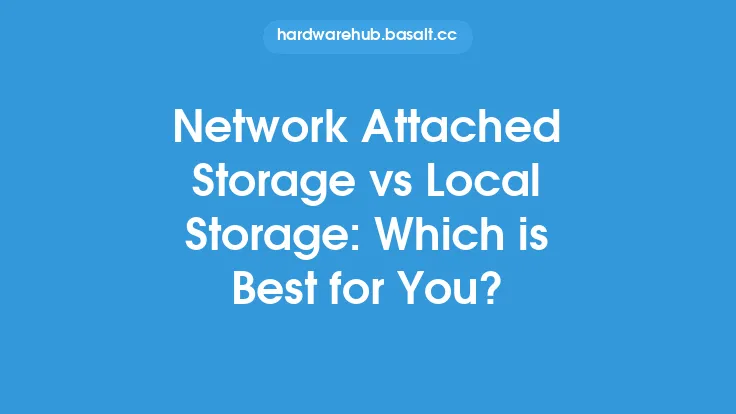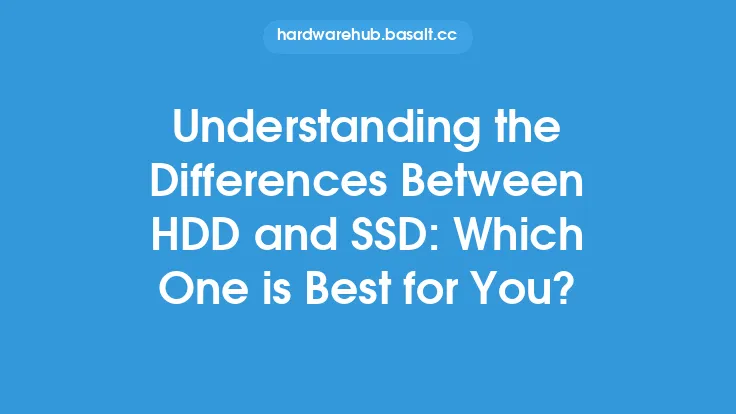When it comes to storing and managing data, individuals and organizations have two primary options: cloud storage and local storage. Both have their own set of advantages and disadvantages, and the choice between them depends on various factors such as data size, accessibility, security, and cost. In this article, we will delve into the details of cloud storage and local storage, exploring their characteristics, benefits, and drawbacks to help you decide which one is best for your needs.
Cloud Storage
Cloud storage refers to the practice of storing data on remote servers accessed over the internet. This allows users to store, manage, and retrieve their data from anywhere, at any time, as long as they have a stable internet connection. Cloud storage providers typically offer a range of services, including file storage, backup, and synchronization. Some of the key benefits of cloud storage include scalability, flexibility, and cost-effectiveness. With cloud storage, users can easily increase or decrease their storage capacity as needed, without having to worry about the physical constraints of local storage devices. Additionally, cloud storage allows for seamless collaboration and file sharing, making it an ideal solution for teams and organizations.
Cloud storage also offers a high level of redundancy and disaster recovery, as data is typically stored in multiple locations and can be easily recovered in case of a disaster. Furthermore, cloud storage providers often implement robust security measures, such as encryption, firewalls, and access controls, to protect user data from unauthorized access. However, cloud storage also has some drawbacks, including dependence on internet connectivity, potential security risks, and vendor lock-in. Users must also consider the cost of cloud storage, which can vary depending on the provider, storage capacity, and features required.
Local Storage
Local storage, on the other hand, refers to the practice of storing data on physical devices, such as hard drives, solid-state drives, or flash drives. Local storage offers a high level of control and security, as users have direct access to their data and can implement their own security measures. Local storage devices are also typically faster than cloud storage, as data is accessed directly from the device rather than over the internet. Additionally, local storage does not require an internet connection, making it a reliable option for areas with poor or no internet connectivity.
However, local storage also has some significant drawbacks. For example, local storage devices are prone to physical damage, theft, or loss, which can result in data loss or corruption. Local storage devices also have limited capacity, which can be a constraint for users with large amounts of data. Furthermore, local storage can be more expensive than cloud storage, especially for large-scale storage needs. Users must also consider the cost of maintenance, upgrades, and replacement of local storage devices, which can add to the overall cost.
Comparison of Cloud Storage and Local Storage
When comparing cloud storage and local storage, several factors come into play. One of the primary considerations is accessibility. Cloud storage offers greater accessibility, as users can access their data from anywhere, at any time, using any device with an internet connection. Local storage, on the other hand, requires users to be physically present with the storage device to access their data. Another important consideration is security. While cloud storage providers implement robust security measures, local storage offers a higher level of control and security, as users have direct access to their data and can implement their own security measures.
Scalability is another key factor to consider. Cloud storage offers greater scalability, as users can easily increase or decrease their storage capacity as needed. Local storage devices, on the other hand, have limited capacity, which can be a constraint for users with large amounts of data. Cost is also an important consideration. Cloud storage can be more cost-effective than local storage, especially for large-scale storage needs. However, the cost of cloud storage can vary depending on the provider, storage capacity, and features required.
Use Cases for Cloud Storage and Local Storage
Both cloud storage and local storage have their own set of use cases. Cloud storage is ideal for users who require accessibility, scalability, and collaboration. For example, cloud storage is suitable for teams and organizations that need to share files and collaborate on projects. Cloud storage is also ideal for users who require a high level of redundancy and disaster recovery, such as businesses that rely on data for their operations. On the other hand, local storage is suitable for users who require a high level of control and security, such as individuals who store sensitive data or organizations that require compliance with regulatory requirements.
Local storage is also ideal for users who require fast data access, such as video editors or gamers. Additionally, local storage is suitable for users who do not have reliable internet connectivity, such as those in remote areas or with poor internet infrastructure. Ultimately, the choice between cloud storage and local storage depends on the specific needs and requirements of the user. By considering factors such as accessibility, security, scalability, and cost, users can make an informed decision about which storage solution is best for them.
Technical Considerations
From a technical perspective, cloud storage and local storage have different architectures and requirements. Cloud storage typically uses a distributed architecture, where data is stored across multiple servers and locations. This allows for greater scalability, redundancy, and disaster recovery. Cloud storage providers also implement various technologies, such as encryption, compression, and deduplication, to optimize storage capacity and performance. Local storage, on the other hand, typically uses a centralized architecture, where data is stored on a single device or location.
Local storage devices also require different technologies, such as disk formatting, file systems, and storage protocols, to manage and access data. Additionally, local storage devices require regular maintenance, such as backups, updates, and upgrades, to ensure data integrity and device performance. Cloud storage providers, on the other hand, typically handle maintenance and upgrades on behalf of the user, freeing up resources and reducing the administrative burden.
Conclusion
In conclusion, the choice between cloud storage and local storage depends on various factors, including accessibility, security, scalability, and cost. Cloud storage offers greater accessibility, scalability, and collaboration, making it ideal for teams and organizations that require shared access to data. Local storage, on the other hand, offers a higher level of control and security, making it suitable for users who require direct access to their data and implement their own security measures. By considering the specific needs and requirements of the user, and weighing the advantages and disadvantages of each storage solution, users can make an informed decision about which storage solution is best for them. Ultimately, a combination of both cloud storage and local storage may be the most effective solution, offering the benefits of both worlds and providing a robust and flexible storage strategy.





